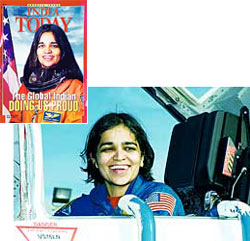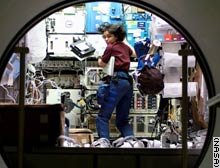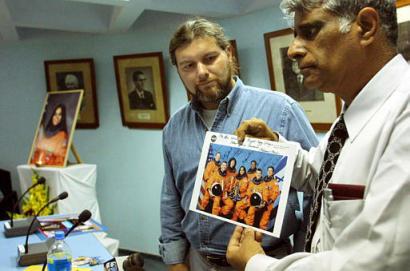Indian newspapers, which accompanied Kalpana Chawla's journey through space, published the exact time when the shuttle passed over India, and when it was learned of her death, crowds flocked to temples to ring bells in her memory. But the first Indian astronaut did not want to be a representative
 Chawla (in the small picture on the cover of the magazine "India" Today). In her first space flight, in 1997, she was blamed for errors that caused a scientific satellite to go out of control
Chawla (in the small picture on the cover of the magazine "India" Today). In her first space flight, in 1997, she was blamed for errors that caused a scientific satellite to go out of control
India mourned the death of Kalpana Chawla, the first Indian-born astronaut, after the space shuttle Columbia disintegrated over Texas, minutes before it was scheduled to land on February 1 in Florida. Chawla was a new kind of hero in India, which has been launching satellites into space for years and is preparing in the current decade to launch a satellite that will orbit the moon. "She was a skilled astronaut, and NASA is a stable organization. We will find out the problem and recover", said the head of the Indian Space Research Organization), Krishnaswamy Kasturirangan.
Before taking off in "Columbia" on January 16, her second flight in space, Chawla told reporters that she drew her inspiration to fly from Jay. R. enough. Tata, who flew India's first mail planes. After her first space flight in 1997, Chawla told the "News India-Times" how she observed from space the Himalayas and the great rivers of India. "The Ganges valley looks majestic, mind-blowing," she said, "Africa was visible when the ferry passed over India, she told the crew: "I lived close to this place" like a desert, and the Nile looked like an artery in it."
Chawla was born 41 years ago in the city of Karnal, a distance of 128 km north of New Delhi. In 1980 she immigrated to the United States and received American citizenship. There she earned a master's degree in aeronautical engineering at the University of Texas and a doctorate at the University of Colorado in Boulder, which she received in the late 80s. In 1994 she became an astronaut. On her first space flight, in 1997, Chavala was accused of errors that caused a scientific satellite to go out of control. Other astronauts went into space to catch and retrieve it. She then told "India Today" that a NASA investigation found that the incident was due to a series of small mistakes. Chawla then said that when the ferry returned and passed over India, and specifically New Delhi, she pointed to it and told the rest of the crew, "I lived close to this place."
Chawla's parents, two sisters and her brother-in-law traveled to the United States to watch the landing. Her brother, Sanjay, was the only one who did not fly to the US and was informed of the disaster on television. "I went from one news broadcast to another and realized that something terrible had happened. Whenever someone in your family is involved in such a project, you must be prepared within yourself for such news... If it could happen to others, it could happen to you too. This time it happened to us."
Across India, people heard in horror about the destruction of the space shuttle Columbia and the death of all the crew members. "It's hard to believe that this was the fate of the girl who, as a child, dreamed of reaching the moon," said Chawla's former schoolmate. In her hometown of Karnal, in the northern state of Haryana, hundreds of residents took to the streets and gathered to pray when the tragedy became known. The BBC's Delhi correspondent, Adam Minot, said Chawla was considered a national hero in India and that her death would no doubt evoke a strong sense of loss and grief.
The Prime Minister, Atal Bihari Vajpayee, sent a message of condolences to the President of the United States, George Bush. "For us in India, the fact that one of the astronauts was a woman born in India makes this tragedy even more painful," the message said. He added: "Our heart goes out to the families of the brilliant young men and women who perished on the ferry."
India gives a miracle to those who left India to work and live in foreign countries and succeeded there. They are considered heroes and heroines. Chawla's name appeared at the top of the list of famous and talented Indians. On Saturday, all the national newspapers published the photographs of the astronaut on the front page to mark what was supposed to be a triumphant return to Earth.
Chawla was a source of national pride. In one article she was called "the first Indian woman who aspired to reach the stars". Kalastra was featured on the cover page of India Today magazine two weeks ago. The PTI news agency calculated when Indians should watch the sky when the shuttle Chawla was flying over. The agency announced to readers in South Bombay and Madras the exact time when they can wave goodbye to their countrymen.
Residents of the small town of Carnell were expecting a celebration on Saturday that turned into mourning. At the Tagore Bel Niketan school, where Chawala studied, about 300 children gathered for an evening of celebrations, songs and dances to mark the planned landing. "The joy was replaced by shock, shock and condolences," said school principal Rajan Lamba. Despite the cold, Karnal residents went to temples on Saturday night to ring bells in honor of Chawala and her teammates.
Although the people of India will feel a deep sense of loss, Chawla was indeed, as described in India Today, a global Indian. In a 1998 newspaper interview, Chavala said: "I never really thought that I was the first or the second in anything, or that I was from a small town. It was just something I wanted to do. It was very important for me to enjoy it." Not long ago she said that although she derives a lot of pride from her roots, she does not see herself as an Indian in space. "When you look at the stars and the galaxy you feel that you don't just come from a specific piece of land, but from this solar system and stars," she said.
India: A satellite will be named after Kalpana Tsawla
The Indian astronaut who died in the "Columbia" crash will be commemorated in a new predictive satellite; President Kalam: She will be a symbol and role model for the younger generation; The college where she attended established a fund in her memory
18.2.2003

Kalpana Chawla on the Columbia ferry, a few days before the disaster. Photo: NASA
The Indian government intends to name a prediction satellite that was put into orbit in space a short time ago, after Kalpana Chawla, the Indian astronaut who died in the crash of the space shuttle "Columbia".
Parliament in New Delhi dedicated the opening of its session this morning to Chawla's memory. President Abdul Kalam, India's rocket man and the father of its nuclear program, spoke in her memory. Voice of Israel reported that the president said that "we hope that Kalpana Chawla will be a symbol and role model for the younger generation in India, and they will dare to set themselves great goals and will succeed in achieving them through hard work, as the Indian astronaut did."
The space studies department of the college where Chawla studied has already announced that it is establishing a scholarship fund in her memory, which will award a prize of 25 rupees (about $500) each year.
Kalpana Tsaula's husband - NASA is not to be blamed
Claims that he represents all families * Visited the university where she studied in India
28.3.2003
By: Avi Blizovsky

The families of the seven astronauts killed in the Columbia explosion on February 1 are not blaming NASA, Indian-born astronaut Kalpana Chawla's husband said Thursday. "It's a risk we knew about, as it happens to the families of military pilots," Jean-Pierre Harrison told 40 aeronautics students at the Panjab College of Engineering, where his wife studied 25 years ago. "In any human initiative, mistakes will always happen."
The seven astronauts and their families planned to visit India together in March, but Harrison ended up arriving alone in the northern Indian city.
He said that the families maintain regular contact, but "emotions still need to be sorted out" regarding their deaths.
Accident investigators meanwhile said that damage to the left wing caused hot air to enter and destroy Columbia and kill the seven astronauts. Researchers still do not know what caused this crack.
"Don't blame NASA or anyone else. They did the best job they could according to the data they had," said Harrison.
Chawla, 41, left for the US in 1980 and became the first astronaut of Indian origin in 1994. She met Harrison in 1982 when the two attended the University of Texas at Arlington and married a year later.
"We talked about it and she said that if Hadar has to happen, it will happen," he said. "It's not such a terrible way to go because it happened in space. I understand that this is something she wanted to do."
Chawla is a national hero in India and young girls said she inspired them as an example of excellence in science and technology."
"What attracted me to her was her inner fire to do everything well. She was determined to use this for something. She was a very private person," said Harrison, who was born in England to a French mother and an English father. He moved to the USA in 1974.
